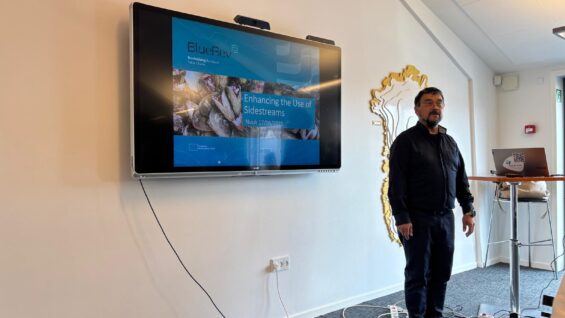The BlueRev Impact: A Look Back at Our Journey
The BlueRev project has reached a significant milestone with its final conference in Brussels, marking an important step in demonstrating how sustainable, inclusive, and circular blue bio-based value chains can support the revitalisation of local communities across Europe.
Over the course of the project, BlueRev brought together more than 900 stakeholders across the blue bioeconomy spectrum: local and regional authorities, seafood and algae producers, SMEs and start-ups, NGOs, students, and indigenous or vulnerable groups. Their involvement through participatory activities, complemented by structured interviews, co-creation sessions, and demonstration workshops, helped in shaping region-specific strategies designed to be both replicable and tailored to local needs. To further support local communities, the project delivered a robust training programme with over 25 sessions, reaching more than 650 people. These sessions were designed to foster employment opportunities and entrepreneurial activity in the blue bioeconomy, and training materials were made available via the BlueRev Support Tool, ensuring broader reach beyond the pilot regions.
A key achievement of BlueRev has been the development of tested tools, canvases, and stakeholder engagement protocols. These resources were used during project activities to help local actors assess their readiness and tailor solutions to their specific regional contexts.
Policy recommendations emerging from the project were presented at the joint final conference (Brussels, June 2025), co-organised with the Engage4Bio, BlueBioClusters, and SKILLBILL projects. The conference gathered more than 85 participants, with over half coming from outside the consortium, highlighting strong external interest and uptake potential. Feedback from participants was extremely positive, underlining the importance of establishing synergies and promoting cross-project collaboration, despite their different thematic focuses.
Some key recommendations emerging from the panels include the need to support regional innovation ecosystems through targeted training, ensure the long-term sustainability of digital tools by engaging stakeholders early, create inclusive governance models that empower communities, harmonise training and certification frameworks across the EU, and promote the use of cultural tools in sustainability initiatives.
BlueRev demonstrated that community-driven, bio-based innovations can become engines for sustainable development when accompanied by successful stakeholder engagement, inclusive governance, and ongoing training. With practical models, strong networks, and strategic policy input, the project offers a replicable roadmap for regions seeking to advance in the European blue bioeconomy.




